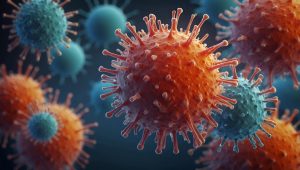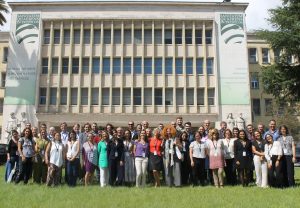Professor Maurizio Zazzi, Department of Medical Biotechnology of the University of Siena, explains why understanding the virus genetic changes is still a key priority
 The Coronavirus Disease 19 (COVID-19) pandemic dramatically changed our life and claimed an estimated around 20 million lives. Viruses are known to change their genetic make-up over time and the COVID-19 agent, the severe acute respiratory syndrome coronavirus 2 (SARS-CoV-2), is no exception. Following its introduction into humans at the end of 2019, the virus has been evolving into different variants, some of which have been labelled as variants of concern (VOCs) because of their rapid spread and/or potential for more severe disease. While experts have been using a complex naming system to describe each different variant, the World Health Organization introduced a naming convention based on Greek letters to classify the major lineages, with Alpha, Delta and, finally, Omicron becoming worldwide dominant at different times during the pandemic. The rule of virtually complete dominance of one specific variant at a time was broken with the omicron variant because, following its appearance in late 2021, the virus has evolved into a dynamic swarm of omicron descendants, none of which has been dominant over the others for a substantial time (this condition has been referred to as Omicron soup).
The Coronavirus Disease 19 (COVID-19) pandemic dramatically changed our life and claimed an estimated around 20 million lives. Viruses are known to change their genetic make-up over time and the COVID-19 agent, the severe acute respiratory syndrome coronavirus 2 (SARS-CoV-2), is no exception. Following its introduction into humans at the end of 2019, the virus has been evolving into different variants, some of which have been labelled as variants of concern (VOCs) because of their rapid spread and/or potential for more severe disease. While experts have been using a complex naming system to describe each different variant, the World Health Organization introduced a naming convention based on Greek letters to classify the major lineages, with Alpha, Delta and, finally, Omicron becoming worldwide dominant at different times during the pandemic. The rule of virtually complete dominance of one specific variant at a time was broken with the omicron variant because, following its appearance in late 2021, the virus has evolved into a dynamic swarm of omicron descendants, none of which has been dominant over the others for a substantial time (this condition has been referred to as Omicron soup).

We asked Maurizio Zazzi, who is Professor of Microbiology at the Department of Medical Biotechnology of the University of Siena and responsible for the laboratory activities within the EU funded EuCARE project (European cohorts of patients and schools to advance response to epidemics), what is the impact of virus variability with COVID-19.
“Viruses are fast evolving agents – Professor Zazzi explains – with high reproduction rates and replication errors as major drivers of random variability. When an animal virus is passed into humans, as occurred with SARS-CoV-2 few years ago, an adaptation process begins which improves the virus ability to survive into the new environment. Key advantages include the ability to bind better to the portal of entry on human cells (the so-called virus receptors) and to neutralize a variety of preconfigured cellular defence systems collectively referred to as innate immunity. Thus, the variants that are better equipped with these abilities are favoured over other variants. Then, each infection or vaccination event triggers a specific and strong second-line defence system (adaptive immunity) able to get rid of the virus and keep memory of this encounter in most cases. At population level, when massive infection and vaccination events accumulate over time, global immunity grows, and the virus has to change as much as possible to escape immunity in the target host species. That’s why we still see SARS-CoV-2 evolution and infections continues to occur and that’s why it is important to protect with vaccination those people who are at higher risk for severe disease”.
How is SARS-CoV-2 evolution studied within the ongoing EuCARE project?

“EuCARE has a major focus on SARS-CoV-2 variants in four areas. First, we are studying how much of the observed clinical variability of COVID-19 is due to the viral variant, including the severity of acute disease and the long-term sequelae (the so called long COVID-19). Second, we are investigating how the different vaccine schedules and natural infections shape the immunity, i.e. what combination of immunization events generates the highest barrier to infection and reinfection, including with future variants. Third, we have been testing how virus variability affects the performance of diagnostic assays. Fourth, we set up and evaluated a system to improve containment and monitoring of the transmission of viral variants at school. These objectives are being pursued through a multidisciplinary framework involving experts in virology, infectious diseases, epidemiology, and bioinformatics. Our department is coordinating the laboratory activities which are functional to the achievement of the objectives. In addition, we are integrating the activities planned for EuCARE with the tasks in another two projects, funded by the Italian Ministry of Health and Ministry of University and Research. One aims at defining the ability of the virus to change into a drug resistant variant while the COVID-19 patient is treated with antivirals or monoclonal antibodies, the other has the objective of setting up laboratory systems to analyse the potential for a variant to cause severe disease. These are both clinically relevant aspects related to SARS-CoV-2 variability.”
Are there any more general achievements with these projects?
“Definitely yes, COVID-19 has been an important lesson for the future. Unfortunately, other pandemic viruses will come, although we cannot predict when. But we can be sure that focusing on virus evolution will be again a key to guide rapid responses by assisting vaccine development and antiviral research, as well as inform non-pharmaceutical interventions to contain the spread of the pathogen. In this context, COVID-19 has greatly improved our technology, collaboration networks and, in one word, preparedness.”
The EuCARE project has 19 Partners Sites, 9 Subcontractors, 6 Collaborators and 16 Members countries. It is funded by the European Union´s Horizon Europe Research and Innovation Programme under Grant Agreement No 101046016.

